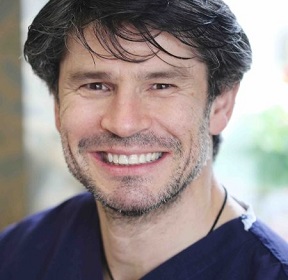
Viorel Matei
IrelandTitle: The effect of the gingival biotype on the crestal bone stability surrounding dental implants. A literature review
Abstract:
Background
Traditionally crestal bone loss has been investigated in the literature by assessing multiple variables that may have an effect on the peri-implant bone remodelling. Thus, polished implant neck, immediate loading versus late loading, and occlusion have been assessed in respect with crestal bone loss around implants. Nowadays, soft tissue biotype has been investigated as one of the factors that may influence the crestal bone stability. The objective of this study was to investigate in which measure soft tissue thickness has an influence in crestal bone loss around dental implants at 1-year follow-up. The question to be answered in this study was the following: “Is there any effect of soft tissue thickness on crestal bone stability around dental implants?”.
Methods
Electronic and manual literature search was carried out in three databases including MEDLINE, EMBASE both via OVID, and Cochrane Oral Health Group Trials Register from 1974 up to June 2020. Finally, nine articles met the inclusion criteria and were analysed in the current review.
Results
Seven of nine studies reported the differences of the crestal bone loss in thin versus thick gingival biotype, and two studies reported only the results of the crestal bone loss in thin gingival biotype. However, those two studies were included in this review due to the fact that the reported results were
in concordance with the results reported in the other seven trials included in the current review. All authors reported that thick gingival biotype shows less crestal bone loss when compared to thin gingival biotype, and a minimum of 2 mm gingival thickness is required to minimise the crestal bone loss. Furthermore, augmentation of thin biotype should be considered as an adjuvant in crestal bone preservation.
Conclusion
All studies included were at high or moderate risk of bias. Consequently, well-designed randomised controlled clinical trials are needed to accurately assess and analyse the effect of gingival biotype thickness on the clinical outcomes of peri-implant crestal bone loss.
Biography:
Viorel Matei graduated in Dentistry from Trinity College Dublin, Ireland and has a Master of Science - Implantology from the University of Manchester, United Kingdom. His master thesis focused on “The effect of gingival biotype on crestal bone stability around dental implants”. In 2014, Matei won the Leo Heslin Memorial Medal awarded by the Royal College of Surgeons in Ireland, and during his undergraduate studies he won the best prosthodontics case presentation. Throughout his professional career, he has attended numerous world-class courses and conferences to keep abreast of new techniques and technologies in dentistry. He possesses a wide range of dental experiences, particularly in the field of implant fixed and removable prostheses. Matei is a member of several dental societies, including in Ireland, United Kingdom, Netherlands and Romania, as well as the Royal Academy of Medicine in Ireland.

